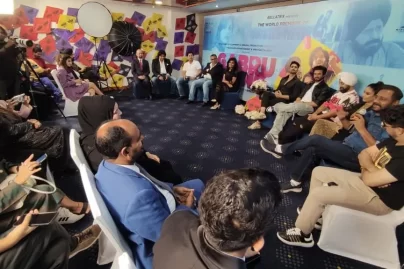Decoding the terminologies and their impact on mental health
Thu 25 May 2023
By Dr Mercedes Sheen, Associate Professor and Interim Head of School at Edinburgh Business School, Heriot-Watt University Dubai
Whether we like it or not, social media has become a daily part of life for many people, both old and young. Instagram, Facebook, and Twitter not only entertain us, but they can also be valuable sources of information. According to Deloitte’s Digital Media Trends Report 2023, younger are more inclined to seek out social experiences in virtual environments, where they can engage with like-minded people, express their opinions and meet new friends. When it comes to forming romantic relationships online, however, dating in 2023 can feel like a game where the rules are constantly changing. According to Statista’s Digital Market Insights, the number of people using social media to find a partner is expected to hit 441 million by the end of 2023 and will generate over 8.7 billion USD in global revenue from online services such as dating websites and matchmaking services. Moreover, the abundance of dating tips and tricks on social media sites such as TikTok and Instagram can be overwhelming and hard to keep up with and the fast-changing world of social media.
So, if you are new to forming online relationships it’s important to understand the language that is used. In the age of social media overload, the terms coined daily can be overwhelming and confusing. People are juggling various situations from relationships to workplace and university stress, and it is never easy to explain a feeling or situation which has given rise to ‘one-word’ terminologies that describe an online dating situation. With social media significantly impacting personal lives, it’s not surprising that people are adopting online dating terminologies to describe various situations and behaviours. Terms such as ‘ghosting’ and ‘breadcrumbing’ have become part of everyday conversations and by labelling and recognizing specific behaviours people can start to understand and feel empowered to gain closure from failed relationships and move on. Here are a few of the most common terms explained!
Breadcrumbing
Breadcrumbing is a term used to describe when someone sends another person flirtatious or affectionate messages to keep them interested. These messages are often days apart and are often sent in a manipulative way to maintain the interest of the other person. Being on the receiving end of breadcrumbing can be very upsetting and can leave you feeling confused since the person’s actions don’t match their intentions. Once you lose interest, the individual who is breadcrumbing you may shower you with constant attention until you respond and then go back to giving you the silent treatment. If you think that someone is breadcrumbing you, let them know how it makes you feel. Alternatively, if you are uncertain whether you are being breadcrumbed, you may want to discuss your concerns with a trusted individual. It is vital to remain receptive to feedback, even if it may not be what you want to hear.
Gaslighting
Gaslighting is a deliberate effort to manipulate someone’s understanding of a situation. For instance, a person who engages in gaslighting might completely deny ever having flirted with you once they sense your heightened interest. Similarly, they might assert that you were aware of their committed relationship (despite you recalling them claiming to be single). It is worth noting that an individual who practices breadcrumbing may also resort to gaslighting, and the converse is true as well. Initially, the issue may appear minor. However, the challenge lies in the fact that even inconsequential occurrences, where you begin to doubt your perception or understanding of that situation, can be very destabilising and impact you in a way where you find it difficult to manage your daily routine with clarity, concentration, and you may even start to question your judgement. Ultimately, this may result in a lack of overall well-being. It is crucial to recognize and accept that your feelings are valid and genuine, so that you may take the necessary steps to improve your well-being.
Ghosting
Ghosting varies in intensity and can occur during any phase of a relationship, ranging from vanishing from a conversation on a dating application and blocking someone, to leaving a text message or an email unread, to abruptly cutting off all forms of communication. The absence of closure creates emotions of doubt, perplexity, apprehension, and a lack of self-confidence in the individual who is being ghosted. Ghosting is often not a reflection of the person being ghosted, so it’s advisable not to take it too personally. The reasons people ghost other people are numerous but it is normally because they have lost interest and want to avoid an uncomfortable conversation. Being ghosted by someone can be very painful, especially if you have started to develop genuine feelings for that person and this can lead to the person being ghosted obsessively following that person on social media. To put it bluntly, if someone is interested, they will find a way to connect with you, so if you are being ghosted, accept it as a life lesson and move on. It’s recommended that you seek advice and support from friends and family. Additionally, consulting with a licensed psychologist can also be beneficial.
Orbiting
The term ‘orbiting’ in the context of dating refers to the act of ceasing direct communication with the person you are dating, while still interacting with their social media posts. It has been referred to as ‘the new ghosting’. People who indulge in orbiting behaviour might perceive their ‘orbiting’ as a demonstration of continued interest. Although initiating contact via text or phone call could seem daunting, engaging with Instagram stories or liking a Facebook post can serve as a minor yet constructive act. The notion of orbiting is becoming increasingly prevalent, particularly on social media, due to the heightened interconnectivity between dating applications and social media platforms. If someone is repeatedly overstepping their boundaries by accessing your content or engaging with you, it’s advisable to block them. Recognize your power and make a choice which works in your best interest.
Experiencing emotional difficulties can be extremely challenging but identifying these destructive dating behaviours, and labelling them appropriately, can help in distancing yourself from feelings of failure. Seeking professional assistance can offer valuable guidance and support to navigate these situations. The expertise of a therapist or counsellor can help people to process their emotions and gain clarity on the reasons behind their experiences and create coping mechanisms to handle the emotional impact. They can also provide practical tips on setting boundaries, effective communication, and approaching future scenarios positively and healthily.

About the writer:
Dr. Mercedes Sheen is an Associate Professor and
Academic Head of Psychology at the Edinburgh Business School, Heriot-Watt University Dubai
Read also – Does the world need AI Psychologists?

 Apr 26 2024
Apr 26 2024













